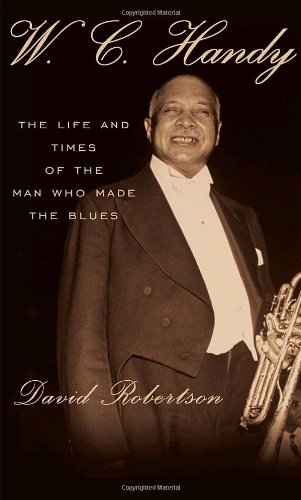
Powell's Books Wholesale
Clearance: W.C. Handy: The Life and Times of the Man Who Made the Blues
Author: David Robertson
Publisher: Knopf
Quantity:
Pickup available at Juilliard Store
Usually ready in 4 hours
Clearance: W.C. Handy: The Life and Times of the Man Who Made the Blues
Juilliard Store
Pickup available, usually ready in 4 hours
144 West 66th Street
New York NY 10023
United States
Choose options
Quantity:
Pickup available at Juilliard Store
Usually ready in 4 hours
Clearance: W.C. Handy: The Life and Times of the Man Who Made the Blues
Juilliard Store
Pickup available, usually ready in 4 hours
144 West 66th Street
New York NY 10023
United States
Quantity:
Pickup available at Juilliard Store
Usually ready in 4 hours
Clearance: W.C. Handy: The Life and Times of the Man Who Made the Blues
Juilliard Store
Pickup available, usually ready in 4 hours
144 West 66th Street
New York NY 10023
United States
Before there was Elvis, there was W.C. Handy, “the man who made the blues.” Here is the first major biography in decades of the man who gave us such iconic songs as “St. Louis Blues,” “The Memphis Blues,” and “Beale Street Blues,” and who was responsible, more than any other musician, for bringing the blues into the American mainstream.
David Robertson charts W.C. Handy’s rise from a rural Alabama childhood in the last decades of the nineteenth century to become one of the most celebrated songwriters of the twentieth. The child of former slaves, Handy was first inspired by spirituals and folk songs, and his passion for music pushed him to leave home as a teenager, despite opposition from his preacher father. He soon found his way to St. Louis, where he spent a winter sleeping on cobblestone docks before lucking into a job with an Indiana brass band. It was in a minstrel show, playing to racially mixed audiences across the country, that he got his first real exposure as a professional musician, but it was in Memphis, where he settled in 1905, that he hit his full stride as a composer. There, Handy frequented the famous saloons and music halls of Beale Street and composed his legendary songs. By the time of his death in 1958, at the age of eighty-five, he had become a major influence on pop culture, his music recorded by countless musicians, from Bessie Smith to Django Reinhardt.
Robertson weaves a rich tapestry of the worlds Handy inhabited: the post-Reconstruction South; the ministrel shows in all their racial ambiguity; the mysterious, forbidding Mississippi Delta; Memphis, with its jumping music scene; and New York’s Tin Pan Alley. At once a testament to the power of song and a chronicle of race and black music in America, W.C. Handy’s life story is in many ways the story of the birth of our country's indigenous culture—and a riveting must-read for anyone interested in the history of American music.
David Robertson charts W.C. Handy’s rise from a rural Alabama childhood in the last decades of the nineteenth century to become one of the most celebrated songwriters of the twentieth. The child of former slaves, Handy was first inspired by spirituals and folk songs, and his passion for music pushed him to leave home as a teenager, despite opposition from his preacher father. He soon found his way to St. Louis, where he spent a winter sleeping on cobblestone docks before lucking into a job with an Indiana brass band. It was in a minstrel show, playing to racially mixed audiences across the country, that he got his first real exposure as a professional musician, but it was in Memphis, where he settled in 1905, that he hit his full stride as a composer. There, Handy frequented the famous saloons and music halls of Beale Street and composed his legendary songs. By the time of his death in 1958, at the age of eighty-five, he had become a major influence on pop culture, his music recorded by countless musicians, from Bessie Smith to Django Reinhardt.
Robertson weaves a rich tapestry of the worlds Handy inhabited: the post-Reconstruction South; the ministrel shows in all their racial ambiguity; the mysterious, forbidding Mississippi Delta; Memphis, with its jumping music scene; and New York’s Tin Pan Alley. At once a testament to the power of song and a chronicle of race and black music in America, W.C. Handy’s life story is in many ways the story of the birth of our country's indigenous culture—and a riveting must-read for anyone interested in the history of American music.
